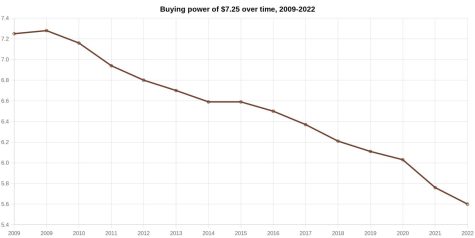Rage over wage
The $7.25 minimum wage sits in the middle of debates, two sides arguing if it should raise or kept as it stands. One side argues that it does not keep up with today’s cost of living while the opposing side says that it will stress businesses to lay off employees, causing more unemployment than already present. With the absence of federal action, companies make efforts to increase their minimum wage. Amazon raised their wage in 2018 to $15 an hour and openly took a stance supporting this wage at a federal level.
January 24, 2022
Georgia and the country experienced the same $7.25 minimum wage for years, constantly fighting for the increase to $15. Protests from New York during 2012 that included over 100 fast-food employees on strike demanding higher wages and other series of events along with this one made way for the “Fight for the $15” idea to raise the minimum wage to $15. In more recent times in 2019, about two-thirds of Americans able to vote favor the idea of having a $15 minimum wage.
Compared to California’s $15 minimum wage, Georgia senators Jon Ossoff and Raphael Warnock introduced the Raise the Wage Act which allowed for the federal minimum wage to increase by $1 or $1.50 for each year that passed after the effective date. The act failed in Congress by a vote of 42-58, extinguishing people’s hopes.
“You make $7.25 an hour and work 40 hours a week, that’s $290 before taxes. Even if you weren’t taxed $290 for 52 weeks is 15,000 dollars. Try to survive a year with 15,000 dollars [and] pay for utilities, housing, food and incidentals; a gallon of milk right now is like 5 dollars, Our minimum wage is not matching inflation, prices are rising and wages are not, people can’t pay for anything,“ dishwasher George Miller said.
With the ongoing labor shortage, also called “The Great Resignation,” workers continue to demand higher wages from their employers while also taking a stand about mistreatment, under-compensation and other problems they face with their jobs. Companies such as Amazon, Target and Starbucks raised their employees’ paychecks while also using more recruitment strategies to try to attract more workers. People regularly argued that their unemployment benefits surpass their employment income.
A year since the “Raise the Wage” Act went unsuccessfully in Congress to refuse to raise the federal minimum wage, residents of Georgia continue to support higher wages and do not hold the intention to back down. Georgia’s minimum wage currently stands at $5.15 per hour and has remained the same for 25 years. The federal minimum wage stands higher at $7.25 per hour since 2009. Since the federal minimum wage exceeds the state minimum wage, employers must pay their employees the federal amount of $7.25 because of the Federal Fair Labor Standards Act which entitles the employee to the higher minimum wage.
“If you live off of minimum wage then you’re not living. The minimum wage doesn’t provide enough money for those seeking to live. It isn’t sufficient for those who require basic needs,” sophomore Fabio Martinez-Johnson said.
Another concern arises with people bringing up how the minimum wage does not catch up with inflation. The minimum wage for 1980 held for $3.10 and holds the purchasing power of $10.46 today. Since the last change to the minimum wage in 2009, $7.25 from that year increased to $9.39 today essentially lowering its purchasing power by 14.8 percent.
The opposing side against raising the minimum wage convey their concerns of an increase in poverty and unemployment. Some of these concerns include if the minimum wage raise went through, businesses would be forced to lay off employees and would start a pattern of decreased hiring levels. Another concern includes employees would instead get a decline in income and would see a decline in shifts and hours. Average family income could decrease and increase the price of consumer goods.

(Ian Webster)
Communities wait for wage increases that have yet to come although with the Raise the Wage Act having 42 votes supporting it workers embrace the chance the future holds for them. The federal minimum wage has not changed in more than a decade and the local minimum wage remains unaltered since 1997. Supporters in despair persistently push for higher wages.




